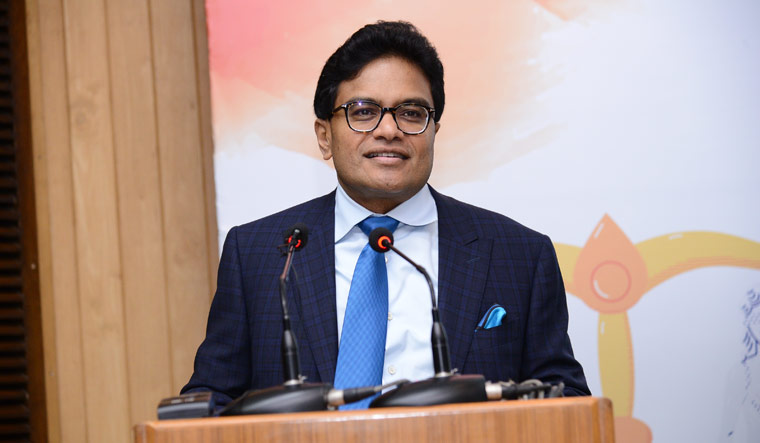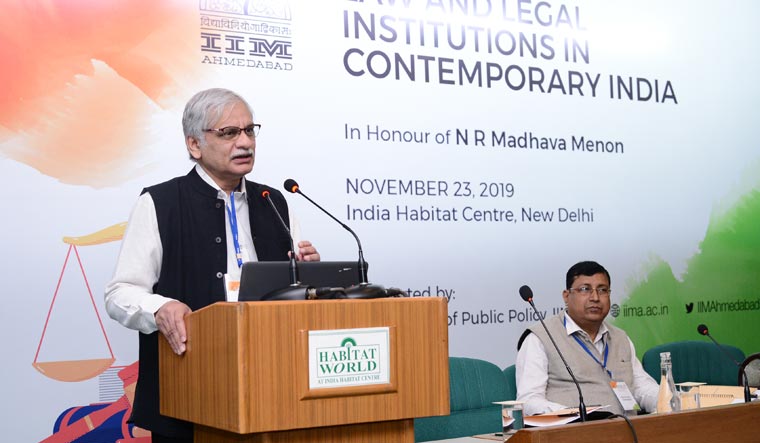“Using seniority as the primary criterion for key judicial appointments defies logic,” said Errol D’Souza, director of IIM Ahmedabad. “For instance, sometimes the chief justice of the Supreme Court may get only a few months, perhaps even a few weeks to discharge his duties after which he will have to retire, which is not an ideal situation,” he said. D’Souza was delivering the keynote address at the inaugural session of the “Conference on Law and Legal Institutions” held in memory of Prof N.R. Madhava Menon, who was the pioneer of modern legal education in India.
Recollecting his personal encounters with Menon, D’Souza spoke about a range of issues on which they agreed as well as disagreed, and suggested that legal institutions could be made more efficient by using insights from management institutions. He also stressed upon the importance of having some kind of work experience before a person embarked upon an academic programme in management and contrasted it with the style of legal education which prevails today in India.
D’Souza said the reason why IIMA continues to offer only postgraduate programs is that it preferred students who have studied other disciplines and have had diverse training. “It added to the discussions in the classroom and promoted a heterogeneity in views,” said D’Souza. The conference, which was held on November 23 at the India Habitat Centre in New Delhi was organised by Prof M.P. Ram Mohan of IIMA, supported by JSW School of Public Policy, IIMA.
In his message commemorating Menon's contributions, Michael Kirby, co-chair of the International Bar Association's Human Rights Institute, said Menon was one of the greatest among India’s great law teachers, scholars and administrators. “He understood that legal teaching is critical to the rule of law and the defence of universal human rights. Kirby said Menon left a legacy most precious for the rule of law in India and was greatly admired beyond India’s borders.
Noted civil rights activist Prof G. Hargopal, who is with the National Law School of India University Bengaluru, suggested the importance of a paradigm shift in the legal education system in India. He said Menon had been considering the idea of setting up law universities specifically for tribal communities as neoliberalism had hit them the hardest. The existing law schools like the NLSIU Bangalore and National University of Juridical Sciences—both founded by Menon—are more corporate friendly, and not so successful in defending the rights of the marginalised communities. Hargopal said Menon understood this and wanted to create institutions which addressed the needs of such sections of society.
The flaws in the functioning of the Competition Commission of India, especially while exercising its quasi-judicial functions was the key issue raised by senior Supreme Court lawyer Krishnan Venugopal. He said the CCI sometimes showed a lack of regard for the principles of natural justice, by not giving opposite parties adequate opportunity to present their cases. According to Venugopal, since the head of the CCI is not a judicial member but an administrative member, it might leave the CCI less equipped to deal with issues that require it to interpret and apply other laws in the context of market regulation.
 Supreme Court lawyer Krishnan Venugopal speaking at the conference
Supreme Court lawyer Krishnan Venugopal speaking at the conference
One of the most lively sessions of the conference centred on the role played by the media in shaping law and public policy. Senior journalist Siddharth Varadarajan said the media was being constrained from playing this role because of the growing instances of regulation. He pointed out that regulation of the press by any institution other than the Press Council of India would be repugnant. “The media should regulate its own conduct and the law should intervene only after publication in case other laws were violated by the press,” said Varadarajan. He said there should be an active movement in the country to defend press freedom and called upon the judiciary to play a key role in this regard.
Shilpi Bhattacharya, who is associate professor at Jindal Global Law School, spoke about how teaching and the student-teacher relationship has changed over the past two decades. Comparing her experiences as a student and as a teacher, she said teachers were expected to be more accessible today. “The relationship between students and teachers has become more transactional and students feel entitled to more nowadays—especially in terms of how they are assessed—because of this,” said Bhattacharya. She called upon legal practitioners to step in and make law courses more relevant and effective. “Law teachers can also start gaining some practical experience before starting to teach.”
Nirmal Kanti Chakrabarti, vice chancellor of West Bengal National University of Juridical Sciences, Kolkata, also agreed to the point that practitioners needed to be brought into the classroom to supplement learning. “This would require more practice-oriented papers which focus on different career paths that law graduates might pursue,” he said. Chakrabarti observed that there was an inadequate emphasis on skill learning in law schools and too much attention was paid to learning the law as it is.
Father Davis Panadan, principal, Christ Academy Institute of Law, Bangalore, referred to Menon's desire about training students from marginalised sections of society and rural areas. He said his institution worked on that principle and was about to launch a rural socio-legal sustainable centre. “Students will be placed in one a village under the guidance of a teacher and they will study this village’s culture, society, climate change etc. for a month.” He said it was possible to achieve litigation free villages with the involvement of law students in District Legal Service Authorities and proposed establishing a ‘Nyaya Sevak’ in each village (trained by university teachers and assisted by students) to empower villages to resolve their disputes on their own.
Other prominent speakers who addressed the conference included Anish Sugathan of JSW School of Public Policy, IIMA; Bhavani Prasad Panda, former vice chancellor of Maharashtra National Law University; Shibani Ghosh, fellow, Centre for Policy Research; R.J.R. Kasibhatla, deputy legal adviser, ministry of law and Justice; Supreme Court lawyer Siddharth Sharma; JNU professor Ajay Gudavarthy; M.V. Shiju, professor, Christ Academy Institute of Law, Bangalore; and Jacob P. Alex, lawyer, Kerala High Court.



